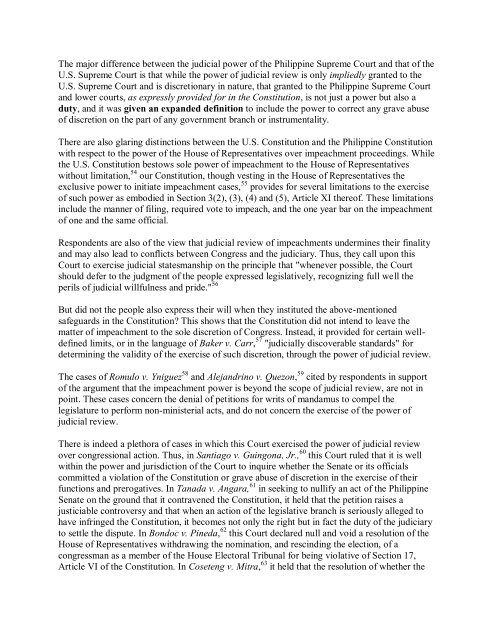Republic of the Philippines SUPREME COURT Manila ... - Columba.us
Republic of the Philippines SUPREME COURT Manila ... - Columba.us
Republic of the Philippines SUPREME COURT Manila ... - Columba.us
Create successful ePaper yourself
Turn your PDF publications into a flip-book with our unique Google optimized e-Paper software.
The major difference between <strong>the</strong> judicial power <strong>of</strong> <strong>the</strong> Philippine Supreme Court and that <strong>of</strong> <strong>the</strong><br />
U.S. Supreme Court is that while <strong>the</strong> power <strong>of</strong> judicial review is only impliedly granted to <strong>the</strong><br />
U.S. Supreme Court and is discretionary in nature, that granted to <strong>the</strong> Philippine Supreme Court<br />
and lower courts, as expressly provided for in <strong>the</strong> Constitution, is not j<strong>us</strong>t a power but also a<br />
duty, and it was given an expanded definition to include <strong>the</strong> power to correct any grave ab<strong>us</strong>e<br />
<strong>of</strong> discretion on <strong>the</strong> part <strong>of</strong> any government branch or instrumentality.<br />
There are also glaring distinctions between <strong>the</strong> U.S. Constitution and <strong>the</strong> Philippine Constitution<br />
with respect to <strong>the</strong> power <strong>of</strong> <strong>the</strong> Ho<strong>us</strong>e <strong>of</strong> Representatives over impeachment proceedings. While<br />
<strong>the</strong> U.S. Constitution bestows sole power <strong>of</strong> impeachment to <strong>the</strong> Ho<strong>us</strong>e <strong>of</strong> Representatives<br />
without limitation, 54 our Constitution, though vesting in <strong>the</strong> Ho<strong>us</strong>e <strong>of</strong> Representatives <strong>the</strong><br />
excl<strong>us</strong>ive power to initiate impeachment cases, 55 provides for several limitations to <strong>the</strong> exercise<br />
<strong>of</strong> such power as embodied in Section 3(2), (3), (4) and (5), Article XI <strong>the</strong>re<strong>of</strong>. These limitations<br />
include <strong>the</strong> manner <strong>of</strong> filing, required vote to impeach, and <strong>the</strong> one year bar on <strong>the</strong> impeachment<br />
<strong>of</strong> one and <strong>the</strong> same <strong>of</strong>ficial.<br />
Respondents are also <strong>of</strong> <strong>the</strong> view that judicial review <strong>of</strong> impeachments undermines <strong>the</strong>ir finality<br />
and may also lead to conflicts between Congress and <strong>the</strong> judiciary. Th<strong>us</strong>, <strong>the</strong>y call upon this<br />
Court to exercise judicial statesmanship on <strong>the</strong> principle that "whenever possible, <strong>the</strong> Court<br />
should defer to <strong>the</strong> judgment <strong>of</strong> <strong>the</strong> people expressed legislatively, recognizing full well <strong>the</strong><br />
perils <strong>of</strong> judicial willfulness and pride." 56<br />
But did not <strong>the</strong> people also express <strong>the</strong>ir will when <strong>the</strong>y instituted <strong>the</strong> above-mentioned<br />
safeguards in <strong>the</strong> Constitution? This shows that <strong>the</strong> Constitution did not intend to leave <strong>the</strong><br />
matter <strong>of</strong> impeachment to <strong>the</strong> sole discretion <strong>of</strong> Congress. Instead, it provided for certain welldefined<br />
limits, or in <strong>the</strong> language <strong>of</strong> Baker v. Carr, 57 "judicially discoverable standards" for<br />
determining <strong>the</strong> validity <strong>of</strong> <strong>the</strong> exercise <strong>of</strong> such discretion, through <strong>the</strong> power <strong>of</strong> judicial review.<br />
The cases <strong>of</strong> Romulo v. Yniguez 58 and Alejandrino v. Quezon, 59 cited by respondents in support<br />
<strong>of</strong> <strong>the</strong> argument that <strong>the</strong> impeachment power is beyond <strong>the</strong> scope <strong>of</strong> judicial review, are not in<br />
point. These cases concern <strong>the</strong> denial <strong>of</strong> petitions for writs <strong>of</strong> mandam<strong>us</strong> to compel <strong>the</strong><br />
legislature to perform non-ministerial acts, and do not concern <strong>the</strong> exercise <strong>of</strong> <strong>the</strong> power <strong>of</strong><br />
judicial review.<br />
There is indeed a plethora <strong>of</strong> cases in which this Court exercised <strong>the</strong> power <strong>of</strong> judicial review<br />
over congressional action. Th<strong>us</strong>, in Santiago v. Guingona, Jr., 60 this Court ruled that it is well<br />
within <strong>the</strong> power and jurisdiction <strong>of</strong> <strong>the</strong> Court to inquire whe<strong>the</strong>r <strong>the</strong> Senate or its <strong>of</strong>ficials<br />
committed a violation <strong>of</strong> <strong>the</strong> Constitution or grave ab<strong>us</strong>e <strong>of</strong> discretion in <strong>the</strong> exercise <strong>of</strong> <strong>the</strong>ir<br />
functions and prerogatives. In Tanada v. Angara, 61 in seeking to nullify an act <strong>of</strong> <strong>the</strong> Philippine<br />
Senate on <strong>the</strong> ground that it contravened <strong>the</strong> Constitution, it held that <strong>the</strong> petition raises a<br />
j<strong>us</strong>ticiable controversy and that when an action <strong>of</strong> <strong>the</strong> legislative branch is serio<strong>us</strong>ly alleged to<br />
have infringed <strong>the</strong> Constitution, it becomes not only <strong>the</strong> right but in fact <strong>the</strong> duty <strong>of</strong> <strong>the</strong> judiciary<br />
to settle <strong>the</strong> dispute. In Bondoc v. Pineda, 62 this Court declared null and void a resolution <strong>of</strong> <strong>the</strong><br />
Ho<strong>us</strong>e <strong>of</strong> Representatives withdrawing <strong>the</strong> nomination, and rescinding <strong>the</strong> election, <strong>of</strong> a<br />
congressman as a member <strong>of</strong> <strong>the</strong> Ho<strong>us</strong>e Electoral Tribunal for being violative <strong>of</strong> Section 17,<br />
Article VI <strong>of</strong> <strong>the</strong> Constitution. In Coseteng v. Mitra, 63 it held that <strong>the</strong> resolution <strong>of</strong> whe<strong>the</strong>r <strong>the</strong>


